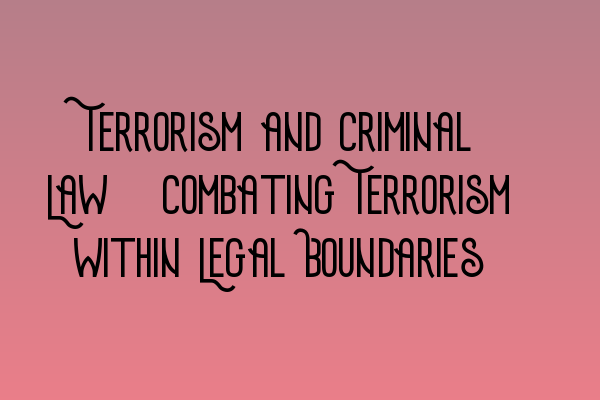Terrorism and Criminal Law: Combating Terrorism within Legal Boundaries
Terrorism is a global issue that poses a significant threat to the safety and security of societies around the world. The fight against terrorism requires a multifaceted approach, combining intelligence gathering, law enforcement efforts, and international cooperation. In the United Kingdom, combating terrorism is a top priority, and the Criminal Law plays a crucial role in this regard.
At SQE Criminal Law & Practice Law UK, we understand the gravity of the situation and the importance of striking a balance between maintaining national security and upholding individual liberties. In this blog post, we will explore how criminal law is used in the fight against terrorism, focusing on its ability to combat terrorism within legal boundaries.
The Legal Framework
The legislative framework in the UK provides the legal basis for combating terrorism. Acts such as the Terrorism Act 2000, the Terrorism Act 2006, and the Counter-Terrorism and Border Security Act 2019 outline the offenses related to terrorism and establish provisions to prevent, investigate, and prosecute acts of terrorism. These laws provide the necessary tools to law enforcement agencies to identify and disrupt potential terrorist activities.
Under these acts, offenses such as planning, assisting, and carrying out acts of terrorism are criminalized. The legislation also covers activities related to financing terrorism, promoting terrorism, and possessing materials useful in the preparation of terrorist acts. The breadth of these provisions ensures that various aspects of terrorism are covered, enabling law enforcement agencies to take decisive action against individuals or groups involved in terrorism.
Preventative Measures
Preventing terrorism is a crucial aspect of combating this menace. The UK has implemented various preventative measures to identify individuals susceptible to radicalization and intervene before they engage in terrorist activities. The Counter-Terrorism and Security Act 2015 introduced the Prevent Duty, which requires certain public bodies, including universities, schools, and hospitals, to have strategies in place to prevent individuals from being drawn into terrorism.
These measures focus on early identification and intervention and aim to provide support and guidance to individuals vulnerable to radicalization. They also emphasize community engagement, encouraging individuals from all walks of life to work together in countering the narrative of extremist ideologies. By targeting the root causes of terrorism, these measures contribute to a long-term strategy for combating terrorism within legal boundaries.
Law Enforcement Efforts
Law enforcement agencies play a critical role in combating terrorism. The police, together with intelligence agencies, monitor and gather intelligence on individuals and groups involved in terrorist activities. The use of surveillance, both physical and digital, is an essential tool in uncovering potential threats and preventing terrorist acts.
Once intelligence has been gathered, law enforcement agencies can deploy a range of tactics, such as arrest, search, and seizure, to apprehend individuals suspected of planning or carrying out acts of terrorism. The evidence collected can then be used to prosecute individuals within the criminal justice system, ensuring that they face appropriate legal consequences for their actions.
International Cooperation
Terrorism is not confined by borders, and therefore, international cooperation is crucial in combating this global issue. The UK actively collaborates with other countries, sharing intelligence, resources, and expertise to identify and disrupt transnational terrorist networks. International agreements and conventions, such as the United Nations Security Council resolutions and the European Convention on Human Rights, provide a legal framework for cooperation and information sharing.
Through Interpol, Europol, and other international organizations, law enforcement agencies can work together proactively to prevent acts of terrorism and bring perpetrators to justice. The exchange of information, joint training operations, and coordinated investigations are essential components of this cooperation, allowing for effective and efficient counter-terrorism efforts.
Conclusion
Terrorism is a complex and evolving threat that requires a comprehensive and dynamic response. Criminal law plays a central role in combating terrorism within legal boundaries, providing the legal framework, preventative measures, law enforcement tools, and international cooperation necessary to effectively address this global issue.
At SQE Criminal Law & Practice Law UK, we recognize the challenges posed by terrorism and are committed to staying at the forefront of legal developments in this field. If you would like to learn more about related topics such as the Solicitors Qualifying Examination, LLC formation, or business regulations in the UK, we invite you to explore our Demystifying the Solicitors Qualifying Examination Format, LLC Formation Made Simple: Step-by-Step Guide for UK Entrepreneurs, and Business Regulations in the UK: A Comprehensive Overview articles. Additionally, for those preparing for the SQE Exam, our Preparing for the SQE Exam: Strategies and Resources for Success and SQE Workshops and Webinars: Accelerate Your Exam Preparation articles provide valuable insights and resources to aid your exam preparation.
Together, we can work towards a safer and more secure society.
